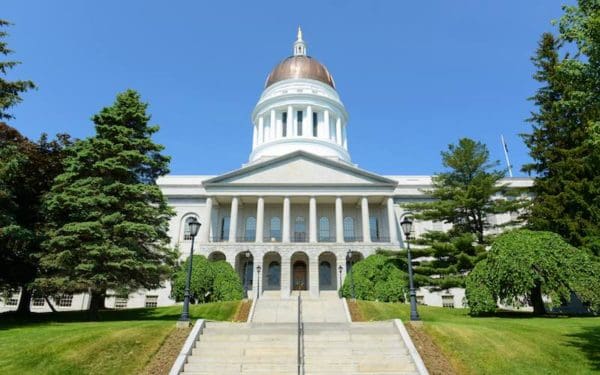
No matter where you fall on the political spectrum, you’ve likely been inundated with emails, texts, Tweets, and headlines about the national stakes of this month’s midterm elections. It can be hard to cut through the noise to understand what these races mean for us here in New England. At the state level, we will see a new governor in Massachusetts and new and familiar faces in state houses and the region’s congressional delegation.
Climate and environmental justice are two of the most critical issues of our time. The federal government recently stepped up and passed new climate laws, but most of the work will still take place on the ground in states and communities, which makes CLF’s advocacy more important than ever.
I spoke with Staci Rubin, CLF’s Vice President of Environmental Justice, and Greg Cunningham, our Vice President of Clean Energy and Climate Change, to break down the election’s outcomes and what we can expect moving forward here at home.
Below is an excerpt from our conversations, edited for clarity.
What’s your initial reaction to the elections in New England as it relates to CLF’s work?
Staci: The elections in New England resulted in several new elected officials who are women and/or people of color, including people who have committed to addressing injustice and the climate crisis, which is a huge win. I’m also thrilled that three ballot initiatives that CLF supported passed: In Vermont, voters eliminated the state’s constitutional exceptions to slavery. In Massachusetts, voters increased funding for transit and education by approving the Fair Share Amendment. They also voted to allow all residents – regardless of citizenship status – to apply for state driver’s licenses.
Greg: I strongly second all that Staci said. Implementing climate laws in five of our six states and defending against anti-climate action in New Hampshire will be a focus of CLF’s work in 2023. In Massachusetts, the election of climate champion Maura Healey makes me optimistic about the possibility of real progress to move away from fossil fuels towards clean alternatives.
In Vermont, several candidates who campaigned for more climate action unseated climate deniers. Their wins have led to a majority capable of overriding potential vetoes from Governor Scott as the state begins implementing its landmark climate law. The re-elections of Governors Lamont in Connecticut and McKee in Rhode Island promise further progress in the year ahead.
In Maine, though Governor Mills will no longer have her party in power in both legislative chambers, her re-election presents an opportunity for strong implementation of the climate law and adoption of much-needed climate-friendly transportation policies.
We must ramp up our development of clean energy like wind and solar throughout the region. Is there an opportunity (or setback) because of Tuesday’s results anywhere in our area?
Greg: The past year has seen unprecedented cooperation among New England states and governors on clean energy issues and the need to get more renewable energy onto our electric grid. The election results should ensure that such progress continues, especially when it comes to offshore wind. With a split legislature, Maine’s Governor Mills faces some headwinds in passing new climate laws that advance renewable energy. But Mills and other pro-climate governors will have the benefit, and control over the spending, of substantial funding from the federal government. Much of the Inflation Reduction Act and infrastructure law spending is directed toward developing clean energy and getting it onto our electric grid.
New England leaders are finally hearing environmental justice concerns. Can we expect any of these newly elected leaders to make justice a priority?
Staci: Yes. Massachusetts Governor-Elect Healey campaigned to address environmental injustices, protect historically marginalized communities, and prioritize climate change while working directly with communities.
The new Attorney General Andrea Campbell is likely to focus on civil rights issues as they intersect with our climate and environment with a focus on justice. She campaigned to fight against polluters, engage communities of color in developing climate policies, and create more green spaces and climate-resilient infrastructure using the proceeds from suing polluters.
In Maine, Governor Mills has the opportunity to sign a meaningful environmental justice law, and we’ll also be pushing Rhode Island officials to pass an environmental justice bill in that state.
What about at the federal level? Will President Biden’s recently passed climate laws affect us here in New England?
Greg: Yes. These laws provide a massive infusion of funding for clean technology, electricity, and transportation infrastructure needs. They also offer enhanced funding for existing programs promoting energy efficiency, building weatherization, electrified heating, and clean transportation. The five New England states with climate mandates (New Hampshire being the outlier) are sure to take advantage of this opportunity to ramp up these programs.
Our advocacy will focus in part on ensuring that states maximize access to those funds, spend them in consultation with the communities most in need and historically neglected by these programs, and direct them to the programs where we will see the biggest impact per dollar spent.
What will CLF’s priority be when it comes to environmental justice as our new leaders get sworn in this January?
Staci: It’s time to pass strong environmental justice laws in Rhode Island and Maine, like the ones we’ve helped pass in Massachusetts and Vermont. In Massachusetts, we’re focusing on reforming the rules that govern where polluting energy facilities can be built to ensure that overburdened communities do not continue to bear the brunt of emissions and their harmful health impacts.
We will also be pushing for bottle bills to pass in most New England states, which would drastically improve recycling rates and reduce litter. Finally, we’ll be advocating for strong spending on transportation with the new federal dollars, fare-free public transit in Connecticut, and a low-income fare on Boston’s MBTA.
Your Vote – Your Voice – Matters
With climate impacts and environmental justice concerns already affecting communities across our region, we can’t waste any time getting to work. CLF will be active in state houses around New England pushing for more protections and a quicker transition to clean energy like solar and wind since the climate crisis isn’t waiting.
You played a critical role in this midterm season by exercising your right to vote. Now, we need your voice to ensure our newly elected (and re-elected) leaders follow through on their promises. Stay up to date on the latest action in your state by signing up for action alerts from CLF.



